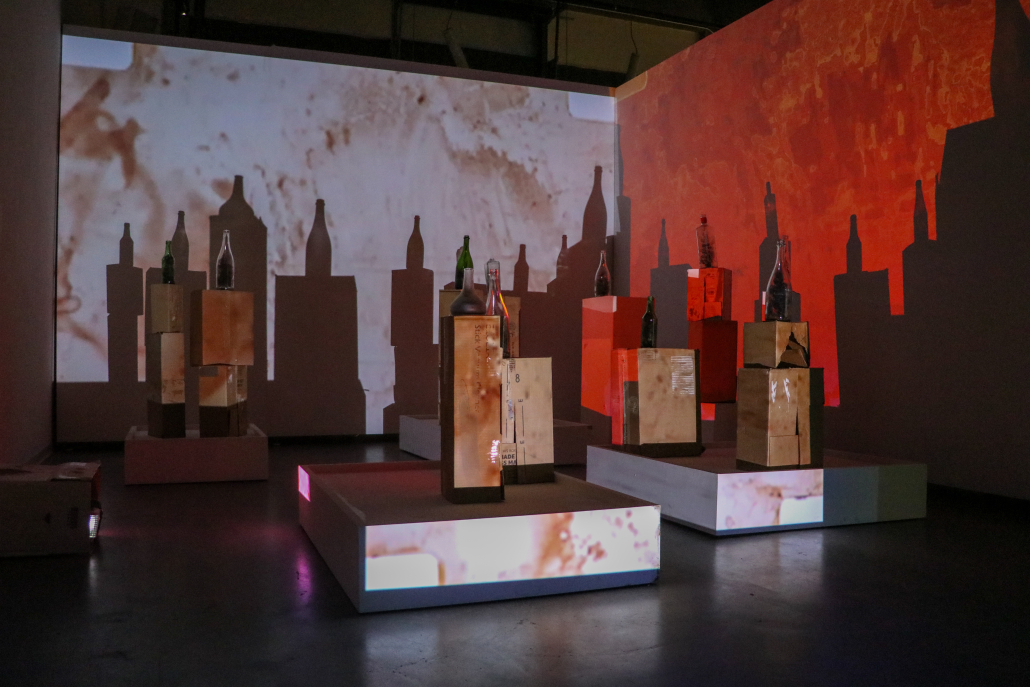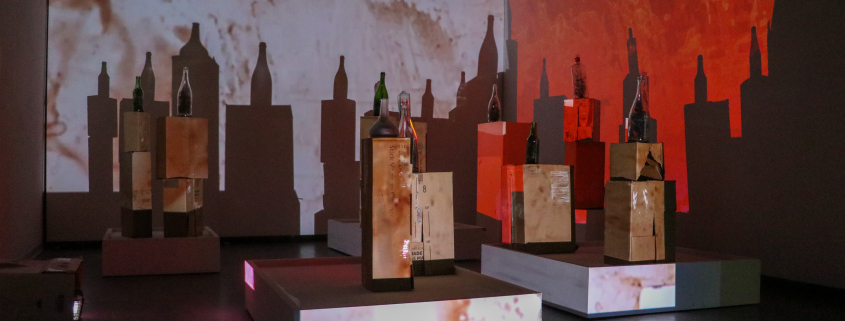‘Leave Out’ captures complex identities

Nostalgia, the dissonance between the old and the new self, and the transition between places — these are the overwhelming concepts that graduate student Vrinda Aggarwal’s debut exhibit holds steady in one space for its audience to feel.
The exhibit, which opened Feb. 17 at the Roski Graduate School, is nothing short of a journey through the psyche of Aggarwal’s anxiety when moving from her hometown in New Delhi to the United States. Projected onto the walls, hung from ceilings and mounted on boxes, the multimedia art in “Leave Out” skillfully scatters pieces of Aggarwal’s experience navigating a new life in a foreign place.
The title of the exhibit is exactly what the exhibit is an ode to — the things that are left out from someone as they make a life-altering transition. As noted in the intro text before you enter the exhibit, Aggarwal’s work “interrogates what fades into the background and what is accepted as a new identity.” The way she does this? By taking old, personal scrap materials and turning it into something new.
“These materials are discarded [because] I have felt discarded,” Aggarwal said. “I’m also not from here, so I’m constantly aware of how my body takes space, and there’s a lot of anxiety that comes with that.”
The first thing you might notice upon entering are two large collages consisting of various papers such as Target receipts and immigration documents hanging loosely from the ceiling. The papers are marred with ink, redacting some of the text, to showcase the old that is left behind or even distorted in order to create space for something new.
This “botched aesthetic” and the rugged outlines of papers are also a nod to the theme of “geographic displacement,” according to MFA Arts program director Jennifer West, who describes the collage as just one example of how Aggarwal tackles themes of identity and displacement.
“I think a lot of her work grapples with those ideas but in a really interesting and abstract way,” West said. “And she’s oftentimes using her own body in the work … you’re constantly reminded of how we move in the world.”
West, also being on the thesis committee board, has guided Aggarwal since she first started the MFA program at Roski and said that the graduate program pushes students to utilize their interests and backgrounds in order to develop meaningful art — something that Aggarwal succeeded in doing through physical art, projections and film.
“She’s really mastered a lot of different kinds of technology,” West said.
Across the room and around a corner, a projector displays scratched film onto the white walls. In front, bottles with her own hair stand on used boxes — another metaphor for the way we are constantly shedding layers of ourselves.
Other multimedia like a small screen mounted on a white table showcases a vintage video with scenes of her friends and with her alone with the caption, “Are you scared? I’m scared. I’m feeling lost … feeling lost.”
Cash-Cooper, a first-year MFA student in Roski Fine Arts, shared critique classes with Aggarwal. He witnessed the progression of these ideas to its execution, and described how he was impressed with the final result.
“I like how intimate everything feels,” Cash-Cooper said. “The pieces draw you in and beg you to come inside the world.”
To Aggarwal, seeing her own exhibit displaying a project she’s worked on during her time at Roski is an indescribable feeling.
“It’s a little bit surreal,” she said. “It feels strange that [the art] are all parts of me in some way.”
“Leave Out” will be available for viewing until Feb. 25.

